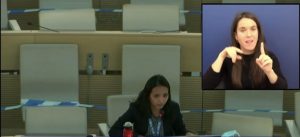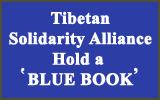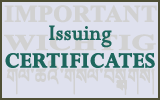Tibet Bureau Geneva raises the situation in Tibet at the UN Forum

The Tibet Bureau in Geneva raised the situation in Tibet and called upon China to address the underlying grievances of Tibetans by respecting Tibetan people’s historical, social and cultural roots.
UN Advocacy Officer Kalden Tsomo from the Tibet Bureau Geneva told the UN Forum on minority issues that Tibetan people are facing the imposition of social structural and demographic change; lack of opportunity to acquire knowledge on Tibetan history, culture and traditions; and lack of employment opportunity in Tibet. “These have led to a cycle of conflicts and protests, including self-immolation protests by over 155 Tibetans in Tibet,” she said.
The 14th Session of the UN Forum on minority issues convened in hybrid format from 2 December to 3 December 2021 focused on the root causes of contemporary conflicts involving minorities, legal and institutional frameworks; early prevention of conflicts; and initiatives to protect the rights of minorities better to prevent conflicts.
She has highlighted the Chinese authorities’ closure of all remaining Tibetan medium schools and informal Tibetan language classes, including the recent demolition of the Drago Monastery school in the Kardze Tibetan area. “Job markets are increasingly dominated by a state-sponsored influx of Chinese into Tibetan areas, leaving local Tibetan college graduates with no job prospects.” Kalden further raised that the survival of Tibetan people with its culture, language and identity is under severe threat in the face of China’s ever-growing push to “Sinicize” every aspect of Tibetan people’s way of life.
While suggesting recommendations in finding a lasting solution, she called China to address the underlying grievances of Tibetans by respecting Tibetan people’s historical, social and cultural roots and enter into a meaningful dialogue with Tibetan representatives under the framework of the Middle Way Approach as envisioned by His Holiness Dalai Lama and; Urged the UN Mandate holders to understand the sense of conflict, crisis and complexities faced by Tibetan people under China, and pay attention to social exclusionary processes and cultural genocide in Tibet.




